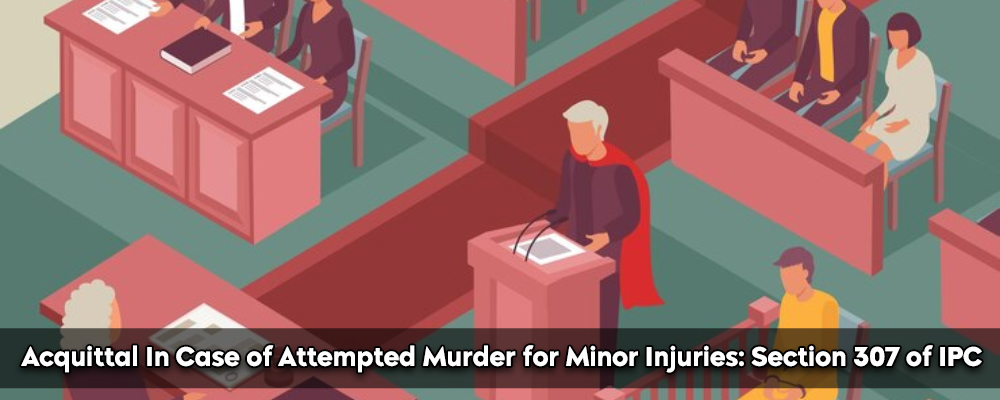Section 307 IPC addresses the serious allegation of attempting to kill someone, which has serious consequences. The court’s ruling is in accordance with an advanced theory of unlawful intent and the requirement for a commensurate response in court.
Section 307 IPC Punishment
Section 307 IPC states that a person who commits an act by knowing or intending to likely cause death by doing so would be found guilty of murder, punishable by imprisonment for a maximum of ten years or as well as a fine. If the act of the individual causes harm to any person, they could face life imprisonment or another suitable punishment as will be prescribed by the judge.
Need A Legal Advice
The internet is not a lawyer and neither are you. Talk to a real lawyer about your legal issue

Section 307 IPC Ingredients
- The targeted act has to be of a nature that would result in killing the victim if it weren’t prevented in that time.
- It is especially necessary for establishing the intent to kill clearly as well as beyond a reasonable doubt.
- The degree of the injury faced by the victim alone cannot suffice and establish the reason for killing. To prove this, the prosecution has to present evidence such as an attack on the vital organs of the victim using any kind of lethal weapon.
- In accordance with this particular provision, it is even necessary to demonstrate and prove that the defendant intended and had the intention to cause the attempted murder in order for them to be found guilty of the offense.
- Under normal circumstances, the perpetrator’s conduct or act would lead to the victim’s death.
Sivamani and Anr. v State: Facts of the Case
- The convicts were charged with plotting to kill the complainant. The defendants were found guilty in accordance with Section 307 of the IPC.
- The accused parties planned an act to end the victim’s life. As a result, the accused began abusing the victim’s mother as well. As a result, the victim’s mother only had a minor back injury and he received injuries to his right shoulder area and left thumb.
Sivamani and Anr. v State: Considerations and Precedents
- The Court further stated that in Jaga Ram v. State of Haryana and State of Madhya Pradesh v. Kanha, it was noted that while a grievous or potentially fatal injury had not been necessary for maintaining a conviction under the virtue of Section 307, IPC, the accused’s intention could be determined from the real injury, if any, as well as from the surrounding circumstances.
- These cases reinforce the position that a fatal injury alone does not overturn a conviction under Section 307 of IPC. Among other factors, one can assume purpose based on the type of weapon used and the force of the blows delivered.
Sivamani and Anr. v State: Decision by the Supreme Court
The aspect of criminal intent was considered to be one of the most important factors that the Supreme Court took into account.
- First of all, the Court observed that no serious or repeated blows took place.
- Second, the victims’ wounds were very much simple in nature.
The Court concurred with the appellants’ counsel that convictions under Section 307 of the IPC are unsupportable because only offenses under Section 323 (Punishment for voluntarily causing hurt) and Section 324 (Voluntarily causing hurt by dangerous weapons or means) of the IPC can be shown.
In light of this, the Supreme Court dismissed the appeal, changed the conviction based on Section 323 and Section 324 of the IPC, and lowered the sentence to 5 years to the already completed term.
Keeping Criminalization from Getting Overreached
- The ruling of the court can be viewed as a restriction on the exaggeration of criminalization. If the wounds sustained are not serious, prosecuting someone for attempting to kill could prove disproportionate and have unforeseen implications for the accused.
- By looking over the evidence yet again and emphasizing the value of taking a measured technique, the Supreme Court has demonstrated that serious criminal allegations can only be brought after an in-depth examination of the facts.
The latest decision by the Supreme Court in India to overturn an attempted murder conviction in a case featuring minor injuries and not repeated or severe blows sustained without repetitive or severe strikes is an important turning point in the growth of criminal law in the nation as a whole. The court has brought clarity to the meaning and effect of Section 307 IPC by emphasizing the significance of proportional answers in legal proceedings and recognising the complex nature of criminal intent. This decision influences the particular case at present as well as setting an expectation for cases to come, promoting a more thoughtful and unbiased method to the conviction of the attempted murder charges.
One can talk to a lawyer from Lead India for any kind of legal support. In India, free legal advice online can be obtained at Lead India. Along with receiving free legal advice online, one can also ask questions to the experts online free through Lead India.





 Talk to a Lawyer
Talk to a Lawyer